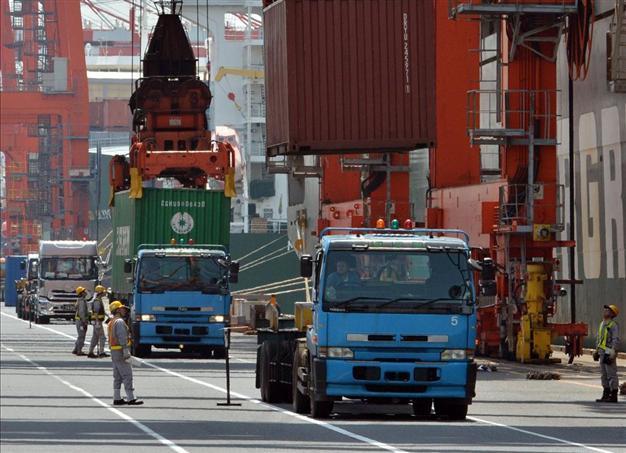Japan’s trade deficit of $83 billion hits record
TOKYO - The Associated Press

Containers are unloaded from an international freighter onto trucks at the international cargo terminal in Tokyo. Japan’s trade deficit quadrupled in March as the weakening yen made fuel imports much more costly. AFP photo
Japan’s trade deficit rose to a record $83.4 billion in the last fiscal year with a 84 percent increase from a year earlier, as exports faltered despite the weakening yen and costs for imported gas and crude oil rose.
Exports fell 2.1 percent in the April-March fiscal year from the year before, to $652.4 billion while imports rose 3.4 percent to $735.8 billion. The deficit of $83.4 billion was up 84 percent from the previous fiscal year.
Customs figures released yesterday also showed a deficit in March for the ninth month in a row, of 362.4 billion yen ($3.7 billion), down from February’s gap of 779.5 billion yen.
A sharp depreciation in Japan’s currency since late 2012 has failed to fully offset weak demand for Japan’s exports as shipments to China have suffered from a flare-up in tensions over a territorial dispute.
Meanwhile, the weaker yen means higher costs for rising imports of natural gas, which is priced in dollar terms, to help compensate for the loss of nuclear power generation capacity after most atomic power plants remain closed after the 2011 disaster at the Fukushima Dai-ichi nuclear plant in northeastern Japan.
Exports to Asia fall 42 percentJapan’s exports to China fell 9.1 percent in fiscal 2012, while its exports to the rest of Asia fell almost 42 percent, the figures show. Shipments to the European Union dropped 14 percent, while imports rose 4.5 percent.
Exports to the United States, one of the few growth areas, rose 10 percent to $116.3 billion, while imports also rose, 1.5 percent, to $62.3 billion, boosting Japan’s trade surplus by nearly 23 percent to $54.1 billion.
Japan’s worldwide exports of cars and other vehicles rose 7.2 percent from the year before, but exports of machinery and electrical machinery fell. Imports of foodstuffs were flat.
Costs for imports of fuel, which accounts for over a third of Japan’s total imports, rose 6.6 percent. That included a 15 percent jump in the value of imports of liquefied natural gas and 5.3 percent for crude oil.
Japanese Prime Minister Shinzo Abe has pushed for a decline in the yen’s value versus other major currencies to help Japanese export manufacturers regain some of their cost competitiveness, though Japan’s long-time strategy of relying on exports to drive growth appears to have lost its potency.
So far, the trade balance has gone increasingly into deficit as import costs have risen, though the inflows of earnings from the massive overseas investments of Japanese corporations have ensured that Japan’s current account remains positive.
